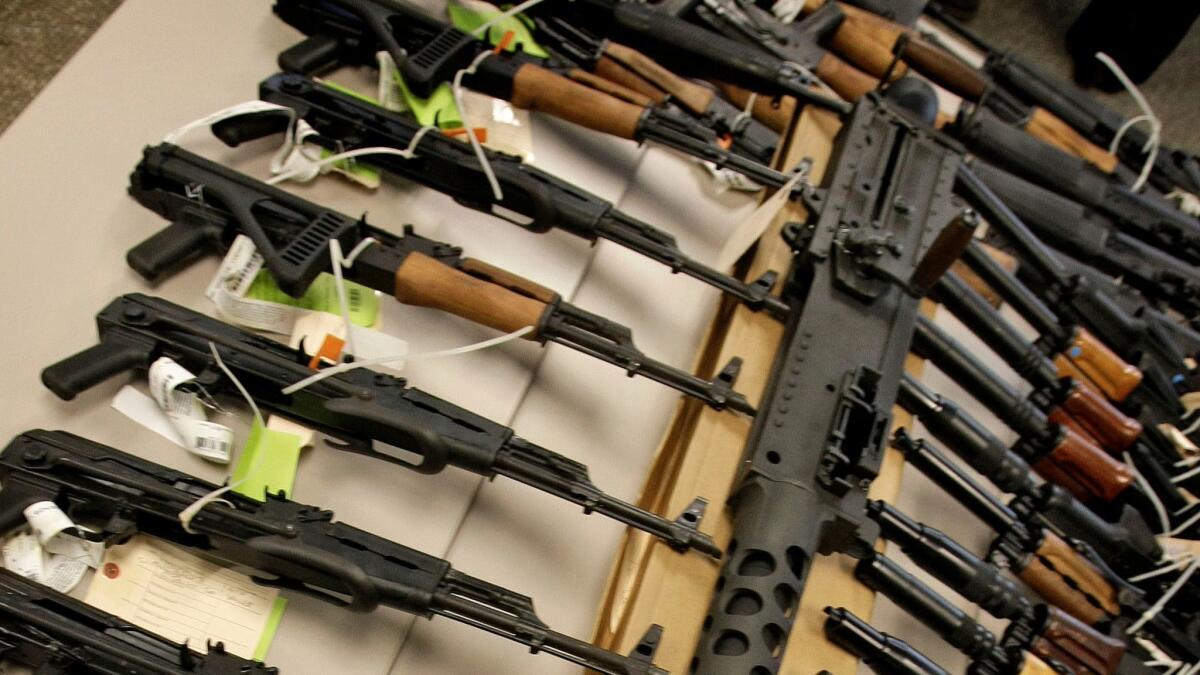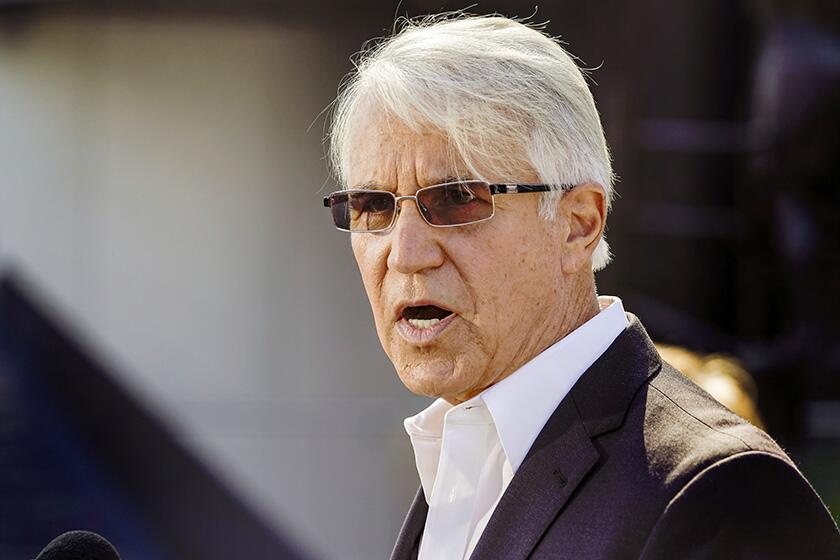Op-Ed: We’re sending guns, crime to Mexico

On a visit to Mexico City in August 2016, then-presidential candidate Donald Trump said, “No one wins in either country when human smugglers and drug traffickers prey on innocent people, when cartels commit acts of violence, when illegal weapons and cash flow from the United States into Mexico.”
Since then, Trump has continued to complain that Mexicans bring crime northward, while studiously ignoring the very real threat that U.S. firepower flowing in the other direction poses to Mexicans.
Although Mexico has some of the strictest gun laws in the world, Mexican criminal organizations have no trouble buying firearms, which they use to control territory, extort business owners, and threaten citizens as well as members of the security forces. The consequences are lethal. In 2002, there were more than 2,600 murder investigations involving firearms. By 2016, that number had increased to nearly 13,000.
To stock their arsenals, Mexican criminal organizations exploit lax U.S. gun laws, relying in part on straw purchases.
Most of the weapons used by criminal groups in Mexico originate in the United States. Each year, an average of 253,000 firearms cross the border, the overwhelming majority of which come from the Southwest states of California, Texas and Arizona. From 2009 to 2014, more than 70% of firearms — nearly 74,000 — seized by Mexican authorities and then submitted for tracing by the Bureau of Alcohol, Tobacco and Firearms came from the United States. Many of these guns were semi-automatic rifles such as the AR-15 and AK-47, cartel favorites that Mexican citizens cannot buy legally.
To stock their arsenals, Mexican criminal organizations exploit lax U.S. gun laws, relying in part on straw purchases.
A “straw purchase” is when a person who is prohibited by federal law from buying firearms contracts a third party to buy them on their behalf. Because there is no limit on firearm transactions in many states, anyone who can pass a background check may buy multiple military-grade firearms in a single visit — which they can then pass along to criminals.
Sometimes firearms traffickers do not even have to lie to purchase a weapon. Although licensed U.S. firearms dealers must conduct background checks and maintain records, among other measures, unlicensed dealers at gun shows, flea markets and other private venues may sell guns without conducting a background check, inspecting a buyer’s identification or documenting the sale in any way.
The business of violence can be highly profitable, and the American gun industry is cashing in, with U.S. sellers and manufacturers arming both sides of Mexico’s conflict. Research from the University of San Diego has shown that half of U.S. gun dealers benefit financially from the U.S.-Mexico illegal gun trade, to the tune of $127.2 million in 2012.
Meanwhile, manufacturers also sell weapons and ammunition to Mexican security forces as they fight well-armed criminal organizations. Between 2015 and 2016, U.S.-based gun manufacturers signed nearly $276 million in commercial firearms deals with Mexico. Other U.S. defense companies signed agreements worth more than $560 million during that period in planes, helicopters and other equipment to outfit Mexico’s military and police.
The U.S. government knows there’s a problem. U.S. Homeland Security Secretary John F. Kelly and Mexican Interior Minister Miguel Angel Osorio Chong reportedly discussed the flow of guns across the border on Feb. 7. Secretary of State Rex Tillerson highlighted the issue as an area of cooperation between the two countries during his visit to Mexico last week. And Trump even signed an executive order in February claiming he would “strengthen enforcement of Federal law” related to illegal gun trafficking.
But if the Trump administration actually wants to solve the problem, it needs to change laws, not just enforce them. The same mechanisms that allow for guns to be trafficked within the United States — unregulated gun shows and online sales, bad actor gun dealers and laws that allow people to buy dozens of military-grade assault weapons and privately resell them without documentation — are the same mechanisms that make it so easy for Mexican criminals to arm themselves.
In the United States, trafficking guns is a high-profit, low-risk activity. There is no federal law against gun trafficking within the country, and although some convicted straw purchasers could get prison time, more often than not they merely face community service or a year of probation.
Many factors have contributed to violence in Mexico. The river of iron from the United States, however, plays a key role in the country’s high death toll. Just as a multibillion dollar border wall will do little to stop the tide of drugs coming into the country, it will do nothing to prevent military-grade weapons from pouring out of it.
If Trump is concerned about organized crime and violence in Mexico, he might want to address the United States’ role in arming it.
Sarah Kinosian is a program officer covering arms trafficking, U.S. defense policy and citizen security at the Washington Office on Latin America. Eugenio Weigend is a senior policy analyst for the guns and crime policy team at the Center for American Progress.
Follow the Opinion section on Twitter @latimesopinion or Facebook
MORE FROM OPINION
California, please stop resisting Trump long enough to get help for our water infrastructure
I’m a Jewish American who worked with Steve Bannon. He is not a racist or an anti-Semite
Trump’s proposed database of crimes by the undocumented is shameless propaganda
More to Read
A cure for the common opinion
Get thought-provoking perspectives with our weekly newsletter.
You may occasionally receive promotional content from the Los Angeles Times.










